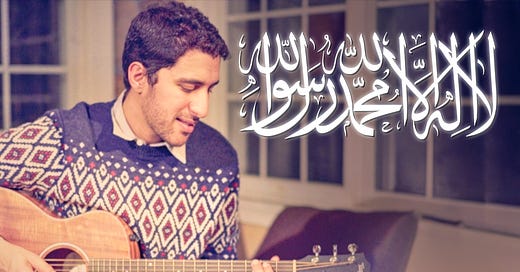La ilaha ill Allah لا إله إلا الله– the most common phrase in Islam, memorized, uttered, and deeply engrained in the hearts of hundreds of millions. It’s so simple that you can say it without even moving your lips. “There is no God but God”—no partners, no equals, no offspring: the core of Islamic creed.
Every year, between Thanksgiving and the New Year, I see a huge spike in social media tags for my version of “Deck The Halls”, The Muslim Christmas Song.
Of course, I’m aware of the controversy surrounding the song. People have strong opinions about it. And honestly, I’m happy to see the criticism—it shows that Muslims care deeply about their faith and have a genuine sense of ‘izzah (honor) when it comes to their religion. This level of commitment is something we don’t always see as strongly in other faith communities.
Muslim reactions to the song have varied widely. Some people see it as a pathetic attempt to assimilate into dominant culture, a Muslim trying to celebrate Christmas. Others think it’s just a silly parody or a funny trending audio. Some see it as a way to use a well-known cultural moment to teach people our view on who Jesus, peace be upon him, really is. And some are offended by it.
What I’ve come to realize is that people often interpret the song based on what they want it to represent.
The Fascinating History of “Deck the Halls” and the Power of Culture
Many of the traditions we associate with Christmas aren’t even rooted in Christianity. The mistletoe, stockings, and even the iconic Christmas tree all have pagan origins.
Deck the Halls itself didn’t originally being as a Christmas song. The melody traces back to ancient times, predating Christianity itself. That melody gave birth the to a Welsh New Year’s tune called Nos Galan, dating back to the 1600s. Then, in the 1800s, Scottish writer Thomas Oliphant layered new lyrics to the same melody, turning it into the Deck the Halls. Over time, cultural shifts linked it to Christmas—even though it makes no reference to the birth of Jesus.
What’s interesting is that Deck the Halls is part of a whole category of “Christmas songs” that aren’t really Christmas songs at all! Think Let It Snow, Jingle Bells, Frosty the Snowman, Winter Wonderland, and Baby It’s Cold Outside…none of these are directly tied to the religious aspects of Christmas.
As Western society shifts away from religion and adopts the new "deen" of consumerism, many now "celebrate" Christmas purely for the vibes and sales. If corporations use this popular tune to sell everything from pizza to gadgets to car insurance, why can’t we use it to share our creed?
The Muslim Christmas Song - There is No God but God
Back to my song. The most repeated phrase in this song is La ilaha illallah—“There is no God but God.” While Christmas has become a major cultural event that’s often separated from the Christian faith, the Muslim understanding of who God is, and who Jesus, peace be upon him, is, remains very clear.
We believe Jesus was a prophet, not the Son of God. He wasn’t divine, wasn’t crucified, and didn’t die for our sins. That’s what my song is about. We believe every person is responsible for their own actions, and that forgiveness comes through repentance and good deeds. We look forward to Ramadan and celebrate Eid for that very reason.
I don’t celebrate Christmas, nor do I believe Muslims should. However, if you live in the west (and increasingly the same in the east), you simply cannot escape the Christmas themed lights, decorations, and catchy music. Whether we like it or not, living in a pluralistic society means sharing cultural moments with the wider community—that's just reality. Our view of Jesus, and the essence of my song, directly contradict Christian doctrine, and that's okay.
I believe in Lakum deenukum, wa liya deen—“You have your way, and I have mine.”
So…what do you think? Id love to read your thoughts




